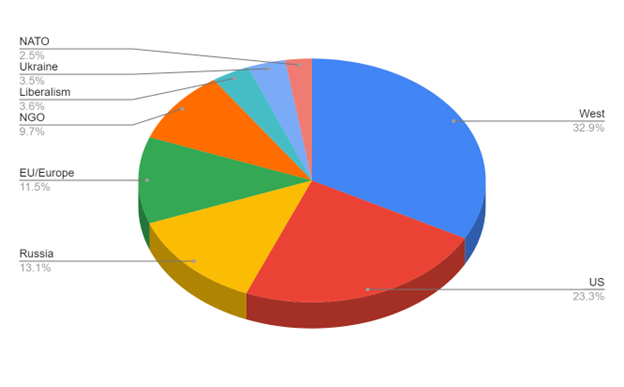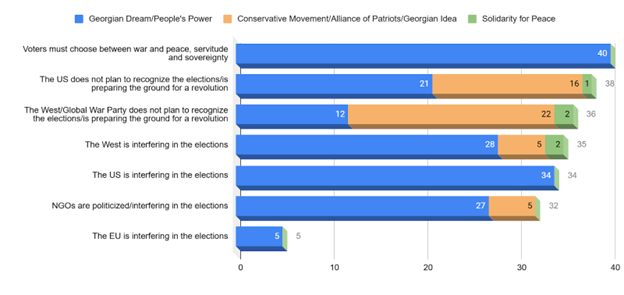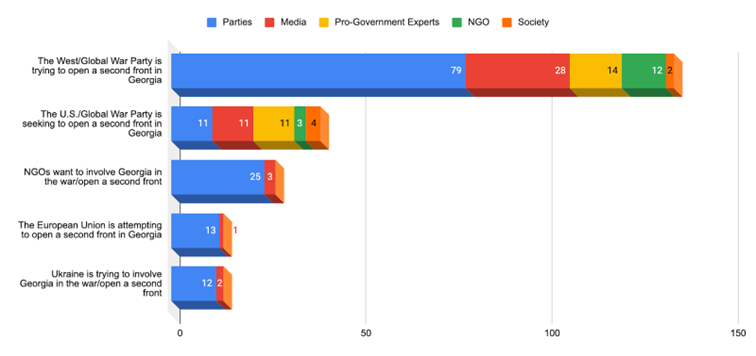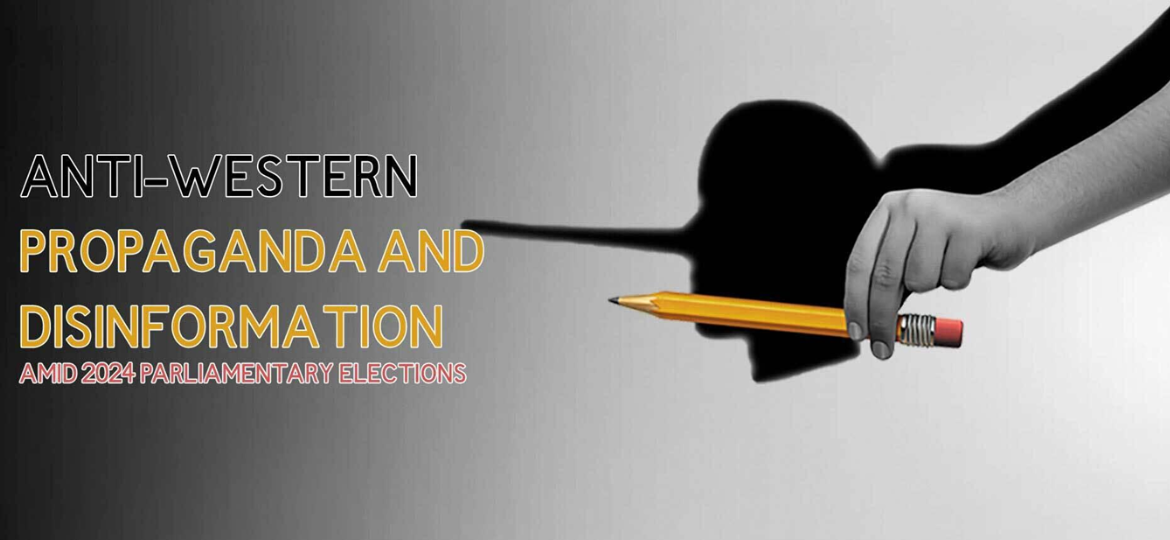During the pre-election period from July 1 to October 1, 2024, the Media Development Foundation (MDF) carried out an in-depth study on anti-Western narratives and disinformation across both traditional and social media platforms. This article examines the anti-Western narratives propagated by various actors ahead of Georgia’s elections and analyzes the disinformation techniques employed to shape public opinion.
Introduction
During the three-month pre-election period of 2024 (July to September), the Media Development Foundation (MDF) analyzed 4,055 comments in its study of anti-Western discourse. The findings revealed that the majority of messages targeted the “collective West” (32.9%), followed by comments specifically aimed at the United States (23.3%). Pro-Russian sentiments, including comments indirectly justifying Russia’s actions, made up 13.1% of the discourse. Criticism was also directed toward the European Union and Europe (11.5%) and non-governmental organizations (9.7%). Comments against liberalism (3.6%) and Ukraine (3.5%) appeared in nearly equal proportions, with NATO receiving the fewest critical comments (2.5%).
It is noteworthy that Russia is the only subject portrayed either positively or with indirect justification for its actions in the presented study, while all other subjects are depicted in a negative context.

Topics of Anti-Western Propaganda
The analysis revealed six main themes of anti-Western messages, which covered the following issues:
| 1. Elections, Democracy, Sovereignty/Democratic Institutions
1. Interference in Georgian elections by the West/US/EU 2. Preparing grounds for revolutionary changes by not recognizing election results 3. Undermining sovereign democracy/interfering in internal affairs 4. Encouraging revolutions/coups 5. NGOs are politicized/acting on behalf of foreign interests 6. Opposition/President is a puppet of the West 7. The West itself faces challenges to its own democracy 8. The voters must choose between war and peace, sovereignty and slavery |
2. Foreign Policy/Security
1. The West/Global War Party is dragging Georgia into war/punishing it for not opening a second front 2. Ukraine’s example shows that the West is not a security guarantor 3. Georgia/Ukraine is being used as a springboard to contain Russia 4. The constitutional provision for Euro-Atlantic integration should be revised; integration should not happen at any cost 5. Only Russia can counter regional threats/restore territorial integrity |
| 3. Identity/Liberalism
1. The West is imposing homosexuality/unacceptable values 2. The West is attacking traditional identity/the Church/Orthodoxy 3. The West is a victim of its own gender-liberal/immigration policies 4. Liberal fascism must end/liberalism has exhausted itself |
4. Russia’s Intervention in Ukraine
1. NATO expansion is the cause of the war in Ukraine 2. The West abandoned Ukraine 3. The Ukrainian government is profiting from the war 4. The Ukrainian government is sacrificing its own people 5. Russia and Ukraine are brotherly nations, but the West has set them against each other 6. Ukraine, as an independent state, never existed; it was created by Stalin |
| 5. Economy/Aid
1. Western aid is directed not at the Georgian people, but at their agency/fight against identity. 2. The West cannot ensure economic prosperity or does not support Georgia’s development. 3. The Russian market is real, while the Western one is inaccessible. 4. Georgia should seek membership in alternative Western alliances (BRICS, 3+3) |
6. Relations with China
1. The West opposes Georgia’s normalization of relations with China. 2. The West’s actions facilitate the China-Russia alliance. |
1. Elections, Democracy, Sovereignty/Democratic Institutions
Themes of elections, democracy, sovereignty, and democratic institutions dominated anti-Western discourse, with particular emphasis on the electoral process and the recent adoption of the so-called “Foreign Agents’ Law” targeting non-governmental organizations. A prominent narrative framed the opposition and the President as actors following Western directives, portraying Western influence as a restraining factor that prevents the prosecution of the opposition party, the former ruling United National Movement (UNM). Other messages focused on elections, sovereignty issues, and the role of NGOs, often claiming that Western influence undermines Georgia’s autonomy.
Among political parties, the ruling Georgian Dream and its affiliated People’s Power made the most statements on election interference, followed by the Alt-Info/Conservative Movement/Patriots Alliance coalition.

The ruling party, Georgian Dream, along with People’s Power, were the primary sources of messages depicting the opposition and the President as Western “puppets” and suggesting that the West interfered in prosecuting the UNM. The same entities dominate messages on election interference. However, on issues such as the encouragement of revolution by not recognizing elections, interference in Georgia’s sovereign matters, and double standards, both the Kremlin-aligned coalition (Alt-Info/Conservative movement-patriots’ Alliance-Georgian Idea) and the ruling party show nearly equal engagement. These narratives commonly argue that the West, grappling with its own democratic challenges, lacks the moral standing to instruct others on democracy.
These elections mark the first time that the ruling party and its affiliated political and media groups accused the West and the so-called Global War party, which were often used as synonyms, of interfering in the elections and delegitimizing the results. This narrative framed Western actions as laying the groundwork for a revolutionary scenario. Alongside the collective West, the United States, European Union, and “politicized non-governmental organizations” were also accused of attempts to interfere in and delegitimize the electoral process. Both pro-Kremlin and pro-government actors promoted the idea that the Maidan-like scenario aimed to bring a politically favorable force to power. Moreover, pro-government media used the Chinese Foreign Ministry as a source on this topic, with most criticism directed at the American organization National Endowment for Democracy (NED), referring to it as having been involved in the Arab Spring, Orange Revolution, and other popular protests against authoritarianism:
Foreign Ministry of China: “It [NED] has become known for attempts to infiltrate, subvert, and sabotage against other countries. It is extremely important to expose NED’s activities and warn all countries to see its true nature, protect themselves from infiltration and sabotage, resist it, and defend their national sovereignty, security, and interests, supporting peace and development worldwide, as well as international law and justice.[1]“
Prime Minister Irakli Kobakhidze’s comments also addressed funding political processes through NED, speaking on the lack of transparency in financing revolutions in response to a journalist’s question:
Irakli Kobakhidze, Prime Minister: “Transparency has no alternative; no one should attempt to stage or fund a revolution in our country in a non-transparent way. This is not a correct practice.[2]”
The perspective that the United States and the West aim to change the Georgian government and incite a revolutionary scenario was also echoed by Kremlin-affiliated parties. Meanwhile, representatives of the Kremlin-aligned Alliance of Patriots asserted that Russia is not interfering in Georgia’s internal politics, emphasizing that Russia’s sole interest is to prevent an anti-Russian government from coming to power—one that might otherwise engage in hostilities against it.[3]
Non-governmental organizations (NGOs) were frequently accused of politicization and acting on behalf of foreign interests, a claim largely voiced by politicians, media outlets, and pro-government experts. Both the ruling party and pro-government propagandist channels, such as Imedi and PosTV, featured hosts who discussed the politicization of NGOs and their alleged involvement in serving foreign agendas. Criticism was particularly directed at the activities of Transparency International Georgia’s director, Eka Gigauri, during her speech at the U.S. Congress, the Democracy Festival supported by the Danish government, ISFED’s activities, and NED-supported projects. Additionally, there were claims that the so-called “Agents’ Law” would expose foreign intentions and limit interference in national sovereignty:
David Kartvelishvili, resident author: “The foreign influence transparency law, introduced to protect national independence, sovereignty, and security, has created an ‘atomic bomb effect’ among international agentocrats and their local agent-puppets…”[4]
2. Foreign Policy/Security
Manipulating fears of war has been a key element of the ruling party’s electoral strategy, a tactic it has employed in the past. Since Russia’s intervention in Ukraine, the ruling party and its satellites accused the West/ Global War Party of attempting to open a second front in Georgia. In response to criticism regarding the country’s democratic backsliding, the ruling party countered with claims that these accusations were part of a broader effort to drag Georgia into military conflict. The ruling party’s electoral message employed a false dilemma technique, offering voters a choice between war and peace, sovereignty and slavery, loss of identity, and its preservation.

Some messages related to the actions of the Global War Party and the manipulation of war fears suggested that the West/Global War Party was targeting Georgia for its sovereign and peace-oriented policies. The Global War Party was often equated with the collective West, and at times, specifically with the United States. Targets of the Global War Party were said to include Bidzina Ivanishvili and Prime Minister Kobakhidze,[5] along with Trump and Fico. These narratives implied that if the opposition were to win the elections, the risks of war would increase, whereas Trump’s re-election was seen as potentially reducing conflict, with his victory linked to the end of the Russia-Ukraine war and a reset in U.S.-Russia relations. Additionally, messages suggesting that Georgia was being punished for its peace-oriented stance were often directed at Bidzina Ivanishvili, who was not only portrayed as a victim of international pressure but also linked to threats against his physical and financial security. These narratives sometimes referenced his private commercial disputes, such as with a Swiss bank, and even depicted him as a fighter against the global establishment and the so-called “deep state.”
Ivanishvili himself predicted that if Trump won the US election, the war in Ukraine would end, leading to a normalization of relations with the U.S. and Europe:
- Bidzina Ivanishvili, Georgian Dream: “The Global War Party wields significant influence over current American and European bureaucracies, which creates a perception among the Georgian public that Georgia is in conflict with the U.S. and the EU. However, once the war in Ukraine ends, interests will shift, and this perception will instantly disappear… If Republicans win the U.S. presidential election, the war could end as soon as January.”[6]
Various actors argued that the West or the U.S. could not serve as a security guarantor for Georgia, asserting that they were neither interested in normalizing relations between Russia and Georgia nor capable of ensuring Georgia’s security during times of war. NATO expansion was cited as the cause of the war in Ukraine, while Georgia’s pro-Western foreign policy was blamed for the loss of its territories. The Kremlin-aligned groups—Alt-Info-Conservative Movement/Patriots’ Alliance and Solidarity for Peace—most frequently questioned the security guarantees offered by the West. Government actors, however, most often manipulated the narrative around Georgia supposedly starting a war at the West’s incitement.
It is also noteworthy that Georgian Dream, which the opposition accuses of shifting away from a Western trajectory and European integration, positioned itself as a pro-European force during the election campaign, using EU symbolism and the slogan “Towards Europe only with peace, dignity, and prosperity.” The ruling party focused on divisions within the West, using a false dilemma to separate “true” from “pseudo” European realities.
- Bidzina Ivanishvili, “Georgian Dream”: “We are choosing between our country’s dignified European future and the unacceptable situation that the radical opposition and foreign actors are trying to pass off as European.”[7]
Regarding relations with Russia, a dominant narrative indirectly justified Russia’s actions by blaming the previous government for the 2008 Russian military intervention in Georgia and even calling for accountability on this basis. Simultaneously, pro-Kremlin actors portrayed Russia as the sole guarantor of restoring territorial integrity. As in previous years, messages aimed at diverting attention from the threat posed by Russia to historical threats (like the Ottoman occupation) remained active, promoting the idea that only Russia could deter Turkey’s threat in the region.
Calls to blame Georgia for the 2008 war and demands to hold the former ruling party accountable were most frequently voiced by Georgian Dream/People’s Power, while Kremlin-aligned parties primarily promoted Russia as the guarantor of territorial integrity.
3. Identity/Liberalism
In messages related to identity, the theme of imposing homosexuality was predominant, often associated with the collective West and the EU. This narrative was closely tied to the “Law on Family Values and Protection of Minors,” initiated and passed by the ruling party during the election campaign. Public discourse equated this law with a ban on “gay propaganda.” Notably, in previous years, Kremlin-affiliated actors had promoted similar legislative initiatives, but the parliamentary majority had never allowed them to progress.[8] Homophobic attitudes were also linked to a scene featuring an LGBTQ+ activist at the opening ceremony of the Paris Olympics, as well as individual attacks on Western politicians who criticized the Georgian government. A particular target in this regard was Michael Roth[9], chairman of the German Bundestag’s Foreign Affairs Committee, who was portrayed as an enemy of Orthodoxy. In response to Roth’s criticism of the “foreign agents” law, his personal life was actively used in discrediting campaigns, not only in mainstream media but also on social media.
In the homophobic context, the technique of false dilemmas was also used, suggesting that the West is divided and that Georgia should find its place in the traditional, conservative space and not in the “corrupt” one, even if the price for this is Euro-Atlantic integration. In this context, anti-EU statements were made, asserting that pursuing integration with the EU in a dignified manner was impossible due to incompatible ideologies.
Ukraine was among the countries accused of abandoning its traditional identity, often portrayed as an enemy of the Church and religion due to its ban on the Moscow-affiliated Church.[10] Kremlin-aligned conservative groups, such as the Conservative Movement/Alliance of Patriots, also made anti-Semitic remarks about Zelenskyy. Among political parties, anti-liberal messages were most frequently spread by the Kremlin-aligned Conservative Movement/Alliance of Patriots. Both Kremlin-affiliated and government actors shared the belief that liberals are fighting the Church/religion and that pseudo-liberal fascism opposes traditional identity.
Anti-liberal messages were largely driven by the belief that liberalism has run its course and that “liberal fascism” must come to an end. Liberalism was frequently depicted as opposing the Church and traditional identity, with claims that it disregards moral values and is fundamentally incompatible with patriotism. Notably, the government leveraged newly formed organizations to advance anti-liberal discourse. One such organization, “Kartuli” (Georgian), was established during an election year and echoed themes like the “dictatorship of the minority” and the dangers of neoliberalism, aligning closely with government rhetoric.
4. Russian Intervention in Ukraine
Several narratives emerged regarding Russia’s intervention in Ukraine, many of which echoed themes previously discussed. These included claims that NATO expansion caused the war, that the West abandoned Ukraine, and that the Ukrainian government was profiting from the conflict while sacrificing its own people. During the pre-election period, Ukraine was often used as a cautionary example to argue that, without pragmatic policies, Georgia could face a similar fate and that the West could not guarantee Ukraine’s or Georgia’s security. Additionally, the ruling party and pro-Kremlin actors at times portrayed Ukraine as an unfriendly country. For instance, Irakli Kadagishvili of Georgian Dream stated, “Unfortunately, Ukraine has become a country where a series of special operations against Georgia are developed, planned, and implemented.”
Beyond security and Georgian-Ukrainian relations, pro-Kremlin actors also promoted narratives denying Ukrainian identity and statehood, framing Ukraine as a construct rather than a legitimate nation.
5. Economy/Aid
Key narratives regarding the economy and Western aid highlighted skepticism and criticism of Western support for Georgia. These narratives included claims that Western aid is not directed at benefiting the Georgian people but instead supports agencies promoting identity-related agendas or LGBT propaganda. It was also argued that this aid primarily serves political processes, benefiting so-called radicals. Criticism was particularly focused on the EU’s decision[11] to suspend a €30 million defense assistance package due to concerns over undemocratic processes, with the funds redirected to civil society and media development.
Further skepticism was fueled by assertions that the U.S., the West, and the EU cannot ensure Georgia’s economic prosperity or meaningful support for its development. Pro-Russian narratives contrasted the perceived inaccessibility of Western markets with the purportedly more viable Russian market. Calls for Georgia to consider joining alternative alliances, such as BRICS or the 3+3 initiative, also gained traction. Both government and Kremlin-aligned actors criticized the political motives behind Western funding, with the ruling party specifically voicing dissatisfaction over the suspension of military aid.
6. Relations with China
Anti-Western narratives related to China were relatively minor, primarily focused on promoting the idea that the West opposes Georgia’s efforts to normalize relations with China and that Western actions contribute to strengthening the China-Russia alliance. Such comments were largely voiced by government-aligned experts and media outlets.
At the same time, representatives of the ruling party framed relations with China as a pragmatic policy achievement, emphasizing that both the Chinese and Russian markets were made accessible through their approach. They argued that relations with China were complementary to, rather than in conflict with, Georgia’s ties to the West.
- Irakli Garibashvili, Georgian Dream: “We opened up the vast Chinese market, the Russian market—people today have full freedom of movement, trade, entrepreneurship, and realizing their talents.”[12]
Disinformation and Other Manipulative Content on Social Media
During the period of July to September, “Myth Detector” identified 25 cases of disinformation and manipulative content against political parties. Additionally, in the pre-election context, individual Facebook users continued to share visual manipulations previously identified by Myth Detector, which included content against both, the opposition and the ruling party. The targets of disinformation were coalitions, specific political parties, and political leaders involved in the elections, although the majority of the fake news, 19 out of 25 cases, was directed against the opposition.
The ruling party was found to spread disinformation regarding Georgia’s involvement in the war, targeting both opposition politicians and non-governmental organizations. The video collages disseminated included compiled quotes from various Georgian politicians and public figures, all related to the war. In one case, the footage featured images of destroyed Ukrainian buildings and the graves of fallen Ukrainian soldiers, directly resulting from the Russia-Ukraine war. These visuals and quotes were strategically combined to craft a powerful narrative, aiming to influence public opinion on Georgia’s stance in the conflict.
Additionally, instances of statistical manipulation were revealed, portraying Georgia as a global leader across various indicators. Among these was a claim by Bidzina Ivanishvili, who stated that according to the World Bank, Georgia’s poverty level reached a historic low in 2024. He further asserted that, following a 12-year improvement in the index, the country now ranks among the top five worldwide.
Four new anonymous Facebook pages were identified, which sought to discredit politicians through short videos (Reels). Of these pages, three exclusively posted anti-opposition content, while one, titled “Mikheil Bidzinauri,” published content critical of both the opposition and the ruling party. This page was linked to Giorgi Gakharia’s party. Furthermore, three Facebook pages operating under the guise of regional media outlets were found to support the ruling party and spread anti-opposition messages. Another Facebook page, “Facts and Choice,” positioned itself as an organization fighting disinformation but was primarily anti-opposition and anti-NGO. Since its creation on August 27, it has published nearly a thousand posts targeting political opponents and civil society organizations.
Additionally, shortly after the election, Myth Detector investigated an alleged audio recording in which a person, claiming to be Giorgi Taktakishvili, co-founder of “Vote for Europe,” discussed pre-election tensions in Georgia. In the recording, he allegedly advised OSCE representatives to reject a bribe from “Georgian Dream.” The disinformation sought to discredit NGO representatives by blaming them for carrying out the “act of telephone terror” and casting doubt on the neutrality and impartiality of the OSCE/ODIHR mission.
Read the full report here.
[1] Georgia First, 17 August, https://bit.ly/4e7LgbA
[2] Marshallpress, 19 August https://mpn.ge/archives/52936
[3] Obieqtivi, Studio N8, 26 August, https://www.myvideo.ge/?video_id=4249626
[4] Georgia First, 23 September, https://geo-first.com/agenturuli-janyis-molodinsi/
[5] The Prime Minister of Georgia, Irakli Kobakhidze, claimed that the European Commissioner for Neighborhood and Enlargement, Olivér Várhelyi, “threatened” him during a phone call, reminding him of the May 15 assassination attempt on Slovak Prime Minister Robert Fico and urging him to be cautious. This allegation was later denied by the European Commissioner. Civil.ge, May 24, 2024: Commissioner Várhelyi Denies Threatening PM Kobakhidze Over Agents’ Law. https://civil.ge/archives/609107
[6] Kviris Palitra, 22 – 28 July
[7] Imedi, Imedi LIVE, 8 Septmeber, https://www.myvideo.ge/v/4251506
[8] Media Development Foundation (2023). “Anti-Gender and Anti-LGBTQ Mobilization in Georgia” pg. 67 https://mdfgeorgia.ge/eng/view-library/239/
[9] Civil.ge, 16 September. “https://civil.ge/archives/624264”
[10] EuronewsGeorgia, 21 August, 2024. Churches linked to Russia were banned in Ukraine, https://bit.ly/4fCV2Du
[11] Radio Liberty, 9 July, 2024, „There will be other steps as well“ -The EU halted 30Mln EUR aid to Georgia” https://www.radiotavisupleba.ge/a/33027609.html
[12] Marshalpress, 8 September https://mpn.ge/archives/54137
